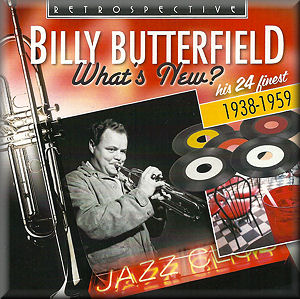Bob Crosby & His Orchestra
1. What's New?
2. Mournin' Blues
Artie Shaw & His Orchestra
3. Stardust
Mel Powell & His Orchestra
4. When Did You Leave Heaven?
Billy Butterfield & His Orchestra
5. Moonlight in Vermont
Brad Gowans & His New York Nine
6. Poor Butterfield
7. Carolina In The Morning
8. Jazz Me Blues
Billy Butterfield & His Orchestra
9. A Ghost of a Chance
10. Moten Stomp
11. More Than You Know
12. Stormy Weather
13. Afternoon in August
Axel Stordahl & Orchestra
14. Nevertheless
Lou Stein & His Six For Kicks
15. Wailin' the Blues
Billy Butterfield & His Orchestra
16. I've Got a Crush on You
17. Little White Lies
18. C“te D'azur
"Gus Hoo" & His Dixie Stompers
19. I'm an Old Cowhand
Billy Butterfield & His Orchestra
20. Someday You'll Be Sorry
Billy Butterfield & His Jazz Band
21. 'Way Down Yonder in New Orleans
22. I'll Be a Friend with Pleasure
Ray Conniff & Orchestra
23. All the Things You Are
24. Beyond the Blue Horizon
The list above should tell you what a popular trumpeter Billy Butterfield was. He played with all these famous bands, plus Benny Goodman and Les Brown. He was also an important member of the World's Greatest Jazz Band from 1968 to 1972, but this CD sadly only covers the years 1927 to 1959. Nevertheless this disc is a good representation of his early work.
Butterfield's surname suggests one of the reasons for his popularity: his tone on the trumpet was as smooth as butter. This quality is evident in such tracks as Stardust and the title-track. Billy stays close to the melody, but his smooth approach doesn't preclude an assertive style which suggests that Billy knew exactly what he was doing. These recordings suggest an affinity with both Bunny Berigan and Bobby Hackett.
Tracks like Mournin' Blues and Jazz Me Blues illustrate another aspect of Billy's playing, as he felt very much at home in Dixieland music. Yet some tracks sound closer to dance music than jazz: sweet rather than swing. The two are mixed in the items by Billy's own orchestra, a short-lived venture which left Billy with considerable debts. He seems to have been more comfortable as a sideman instead of a bandleader. A good example is his tasteful backing to Frank Sinatra in Nevertheless. But there is no doubt that he could swing when required, as in Wailin' the Blues or the muted I'm an Old Cowhand.
Billy's versatility is remarkable. He could punch out a solo, as in Someday You'll Be Sorry, which has a vocal by Lee Wiley. He could sound very like Bix Beiderbecke (listen to Way Down Yonder in New Orleans and I'll be a Friend with Pleasure which come from an LP entitled Billy Plays Bix. And he could fit into the easy-listening jazz of Ray Conniff.
All in all, this is a valuable disc in reminding us of a trumpeter who was never quite a household name but is rightly revered by jazz fans. And this album is particularly valuable for digging out some seldom-heard masterpieces from the archives.
Tony Augarde
www.augardebooks.co.uk
